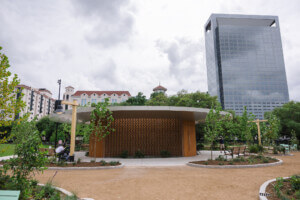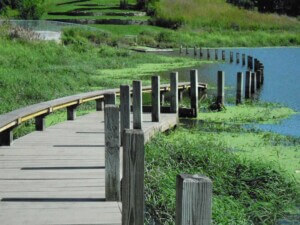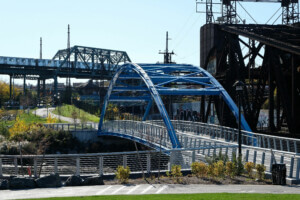United States Customs and Border Protection (CBP) has reversed course and will not continue work, for now, on a border wall replacement project at Monument Mesa, home to the binational Friendship Park, at the westernmost end of the U.S.–Mexico border. Per an August 4 statement from CBP, the temporary pause on the project—one initiated and designed during the Trump administration and continued under President Joe Biden’s Secretary of Homeland Security, Alejandro Mayorkas—will allow the agency to “to engage with community stakeholders and to discuss the planned construction to rebuild barrier sections requiring repair in this area.”
The now-halted effort entails the construction of two 30-foot-tall walls, a primary barrier and border barrier, at the site to replace the aging, weather-warped barriers now in place. Park users and activities worried that the construction of new, taller barriers would further restrict and discourage access to the park, effectively putting an end to the singular gathering space once and for all.
“CBP is committed to preserving access to Friendship Park and, upon completion of the barrier construction in the Friendship Park area, CBP is committed to opening the park a minimum of two days each month, allowing members of the public back into the park for the first time since 2019,” the statement continued.
The U.S. side of the border-straddling half-acre park, located jointly in Imperial Beach, San Diego County, and in the borough of Playas de Tijuana, was shuttered entirely just ahead of the pandemic following years of increasingly restricted access. Established in 1971, Friendship Park has long served as a vital point of interaction between families located on both sides of the border, with many relying on it as a regular venue to convene face-to-face with loved ones without formally crossing an international border.
“We have heard concerns about the project as currently planned, and it is important to me to be responsive to the local community on this issue,” said CBP Commissioner Chris Magnus. “I look forward to continued conversations with the community regarding this project during the pause.”
While the CBP did not make explicit how long the pause will last for, park advocates hope that the agency will honor a request for a pause of 120 days, a period that community coalition Friends of Friendship Park hopes will “lead to authentic conversation and collaboration with the many stakeholders of Friendship Park.”
Friends of Friendship Park applauded the CBP’s decision albeit with “cautious optimism,” deeming it a welcomed “first move.” The agency’s announcement came just days after members of the coalition met with border officials to discuss the future of the beloved park and formally request the 120-day construction pause, a timeframe supported by a wide range of local and and state political figures, faith leaders, and community groups.
“We consider this a step in the right direction,” said John Fanestil, convener of Friends of Friendship Park. “We look forward to hearing from CBP and US Border Patrol staff. We hope that our request for a pause of 120 days will be honored, and that this will lead to authentic conversation and collaboration with the many stakeholders of Friendship Park.”
One major point of concern in Magnus’s announcement is with the CBP’s stated commitment to reopening the park a “minimum of two days each month.” This, as the Friends of Friendship Park pointed out, is a 75 percent reduction from “even the most restrictive terms of access in the last decade and makes no allowance for the ongoing use of the park by participants in the Binational Friendship Garden of Native Plants, The Border Church/La Iglesia Fronteriza, and the dozens of events that are requested each year by community groups and organizations.”
“This declaration reflects CBP’s lack of understanding of the diversity of stakeholder concerns and the need for extensive consultation,” added Dan Watman, a member of the Friendship Park Steering Committee, in a statement. “I’m grateful they appear to be open to learning. Friendship Park is much more than a gate in a wall.”
The Cultural Landscape Foundation included Friendship Park in Race & Space, the Washington, D.C.–based nonprofit’s 2021 edition of its annual Landslide list of at-risk cultural landscapes.
“We’re encouraged by CBP’s commitment to greater public engagement and to ultimately reopening this culturally significant park and uniquely important meeting place on the U.S.-Mexico border,” said Charles A. Birnbaum, President & CEO of The Cultural Landscape Foundation, in an emailed statement to AN.











